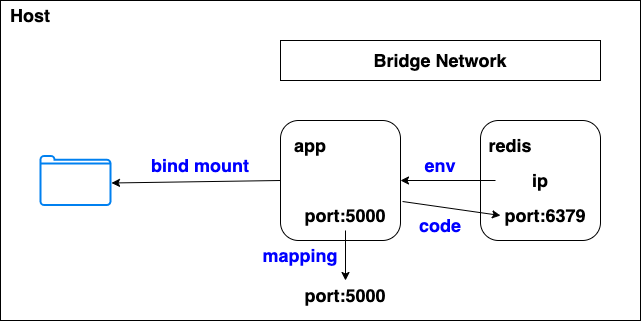Count
# app.py
import os
import time
import redis
from flask import Flask
def get_ip():
return os.getenv('MYREDIS_HOST', 'localhost')
app = Flask(__name__)
cache = redis.Redis(host=get_ip(), port=6379)
def get_hit_count():
retries = 5
while True:
try:
return cache.incr('hits')
except redis.exceptions.ConnectionError as exc:
if retries == 0:
raise exc
retries -= 1
time.sleep(0.5)
@app.route('/')
def hello():
count = get_hit_count()
return 'Hello from Docker! I have been seen {} times.\n'.format(count)
if __name__ == '__main__':
app.run(host='0.0.0.0', port=5000)
# Create the dependent package list
# pip freeze > requirements.txt
flask
redis
# Dockerfile
FROM python:3.7-alpine
WORKDIR /code
ENV FLASK_APP=app.py
ENV FLASK_RUN_HOST=0.0.0.0
RUN apk add --no-cache gcc musl-dev linux-headers
COPY requirements.txt requirements.txt
RUN pip install -r requirements.txt
EXPOSE 5000
COPY . .
CMD ["python", "app.py"]
# compose.yaml
version: "3.9"
services:
webapp:
image: lchenlangley/count
build: .
ports:
- 8000:5000
volumes:
- voltemp:/code
#- .:/code
environment:
- MYREDIS_HOST=redisserver
- FLASK_ENV=development
depends_on:
- redisserver
redisserver:
image: "redis:alpine"
volumes:
voltemp:
# Add directories to allow bind mount in "FILE SHARING" under "Resources" of Docker Desktop
# 1. Create app.py
# 2. Create requirements.txt
# 3. Create Dockerfile
# 4. Create compose.yaml
# 5. Start containers
podman-compose up
# 6. Access the app
http://localhost:8000/
# end containers
podman-compose down

